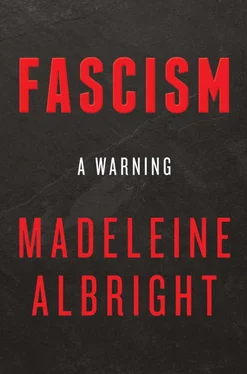Despite the hard blows and the many in political circles who saw no alternative but to give in, the British refused to yield. Hitler had expected to dispose of England before turning his attention to the Soviet Union, but in this aggressive scheme he was denied. He was frustrated, as well, in his effort to persuade Franco to bring Spain into the war and aggravated by Mussolini’s impetuous decision to invade Greece. Meanwhile, in North Africa, British and Indian forces were defending successfully against German and Italian attacks, and in March 1941, courageous Serb patriots overthrew a pro-Nazi government and forced Hitler to intervene there. The Germans were immensely powerful, but as the chancellor was beginning to discover, so—when fully aroused—is the will to resist.
TEN DAYS BEFORE THE WAR BEGAN, GERMANY AND THE SOVIET Union had announced that each would remain neutral in any war involving the other. The agreement was shocking in that the governments were ideological adversaries, yet understandable because they were equally cynical. As arranged, the two invaded Poland from opposite directions and split the country between them. For Stalin, the pact was well-timed. He had spent the late 1930s conducting show trials of allegedly disloyal officials, executing hundreds of thousands. This exercise in paranoia left Russia unprepared for an armed confrontation with the Germans.
Hitler, too, appreciated the timing. He didn’t want to be forced to fight on two fronts—as the Germans had been in the Great War. It made sense, therefore, to delay, but Hitler saw enough of himself in Stalin not to trust. He thought old Joe would try to outfox him and attack as soon as the Red Army was able; better, he surmised, for Germany to land the first punch. War with the USSR had always been a question of when, not if. The vast lands to the east were the prize the Führer coveted most. Part of the reason was material—his military had a bottomless need for grain, meat, oil, and other resources—but he also had a manic desire to expand Lebensraum (living space) in the only direction not blocked by an ocean, channel, or sea. His planners fantasized that, after the war, the whole fertile expanse between the Urals and the Polish frontier would be adorned by gleaming cities populated exclusively by the racially pure—their food supplied by Slav peasants toiling outside the gates, cultivating the soil, raising livestock, eating scraps, and educated only to the level required to understand and obey orders.
Hitler’s decision to invade the Soviet Union in June 1941 was made with the understanding, and indeed the hope, that it would disrupt the food supply of the local population. Four weeks prior to the attack, Göring predicted that “many tens of millions of people in the industrial areas will become redundant and will either die or have to emigrate to Siberia. Any attempt to save the population there from death by starvation… would reduce Germany’s staying power in the war.” This was the same Göring who boasted, “I have no conscience.” That was Nazi morality in a nutshell.
On the first day of summer, German planes, tanks, and infantry roared to the east, catching the Soviet Union by surprise and advancing more than two hundred miles in the first week. Military experts in Berlin and other Western capitals were sure that the storm troopers would prevail quickly. Stalin thought his own staff might kill him because of his stupidity, but that didn’t happen. The Soviets had built an integrated economic and political system that allowed them to mobilize all their resources. After absorbing large initial losses, the Red Army rallied and was able to establish strong defensive positions. Distance and climate gave Russia a crucial strategic edge. Every mile the Germans moved forward lengthened their supply lines, and every passing week brought shorter days, colder winds, more rain, and, starting in October, snow. With the advantage of surprise dissipated, the warriors of the Third Reich—for the first time—found themselves in a real fight.
As Germany’s momentum slowed, Hitler’s rage mounted. He had thought the people of Ukraine and the Baltic States would greet his troops as liberators, and some did, because anti-Russian feeling in these areas was high. The Nazi governors and SS commandos, however, were heavy-handed. Instead of treating the local populations as allies, they drove them into opposition by confiscating food, stealing property, enslaving millions of workers, and beating people up.
Hitler was a student of military history and understood the value of preparation and surprise. What he failed to grasp was the need to adjust his strategy to accommodate unwelcome facts. In his thirst for another conquest, he underestimated Russian resilience and the Red Army’s capacity to find replacements for the men who were killed or taken prisoner. With unwavering trust in his own judgment, he frequently overruled his generals, ordering them to accomplish what no one could. This left his troops, many without boots or winter coats, trudging wearily through the frozen countryside thousands of miles from home.
By early December, the frostbitten Germans had reached the forests west of Moscow, but the Soviets soon launched a counteroffensive that drove them back and put the capital out of reach. In 1942, Hitler tried again and once more attempted too much. On the second day of February 1943, in Stalingrad, the German Sixth Army surrendered some ninety thousand men. The fighting would drag on for months, but the Führer’s eastern expedition was doomed.
MUSSOLINI AND HITLER WERE THE EMBODIMENTS OF FASCISM, but neither could engineer a fully totalitarian state. There was always a gap between theory and reality, between orders from on high and implementation at lower levels. The governments were never quite as efficient as they wished to appear. In Germany, the Gestapo committed countless hideous crimes but also had to work hard to make average citizens believe the regime had agents on every corner and ears on duty in every building. Behind its intimidating facade, the organization was understaffed, swamped with paperwork, and politically unreliable—half its members were not even Nazis. Many Gestapo informants were opportunists who found satisfaction in making trouble for unpleasant neighbors and people to whom they owed money. Then there was the lady from Saarbrücken who informed on her husband to make room—as she told her young son—for “a much better” new dad.
Almost as soon as he took office, Hitler removed women from the bureaucracy, promising them “emancipation from emancipation.” Women were counseled to tend the hearth, mend, sew, make Apfelkuchen , and give birth to the next generation of Aryan supermen. That ambition proved no easier to fulfill than conquering the Soviet Union. From 1933 to 1939, the number of women in the workforce rose from four million to five million as Frauen and Fräuleins helped the economy to keep pace with the demands of war.
In Italy, where Communists and Socialists were outlaws by definition, many survived the Fascist years by keeping their heads down, pretending to be apolitical and—like Mussolini’s father in an earlier era—concealing the family’s red flag in a box buried in the backyard. The prudent tactics enabled leftist movements to resurface with considerable strength even before the war’s end. In Germany, open dissent was rare, but there were pockets of anti-Nazi activity in the trade unions, the private sector, the religious community, and the military. Disgust with Hitler came to the fore most dramatically when, on July 20, 1944, Claus Philipp Schenk (Count von Stauffenberg) tried to blow up the Führer with a time bomb concealed in his briefcase. The explosion left the intended victim with scorched hair, a burned leg, damaged eardrums, and the conviction—due to his narrow escape—that Providence still had his back.
Читать дальше
Конец ознакомительного отрывка
Купить книгу












